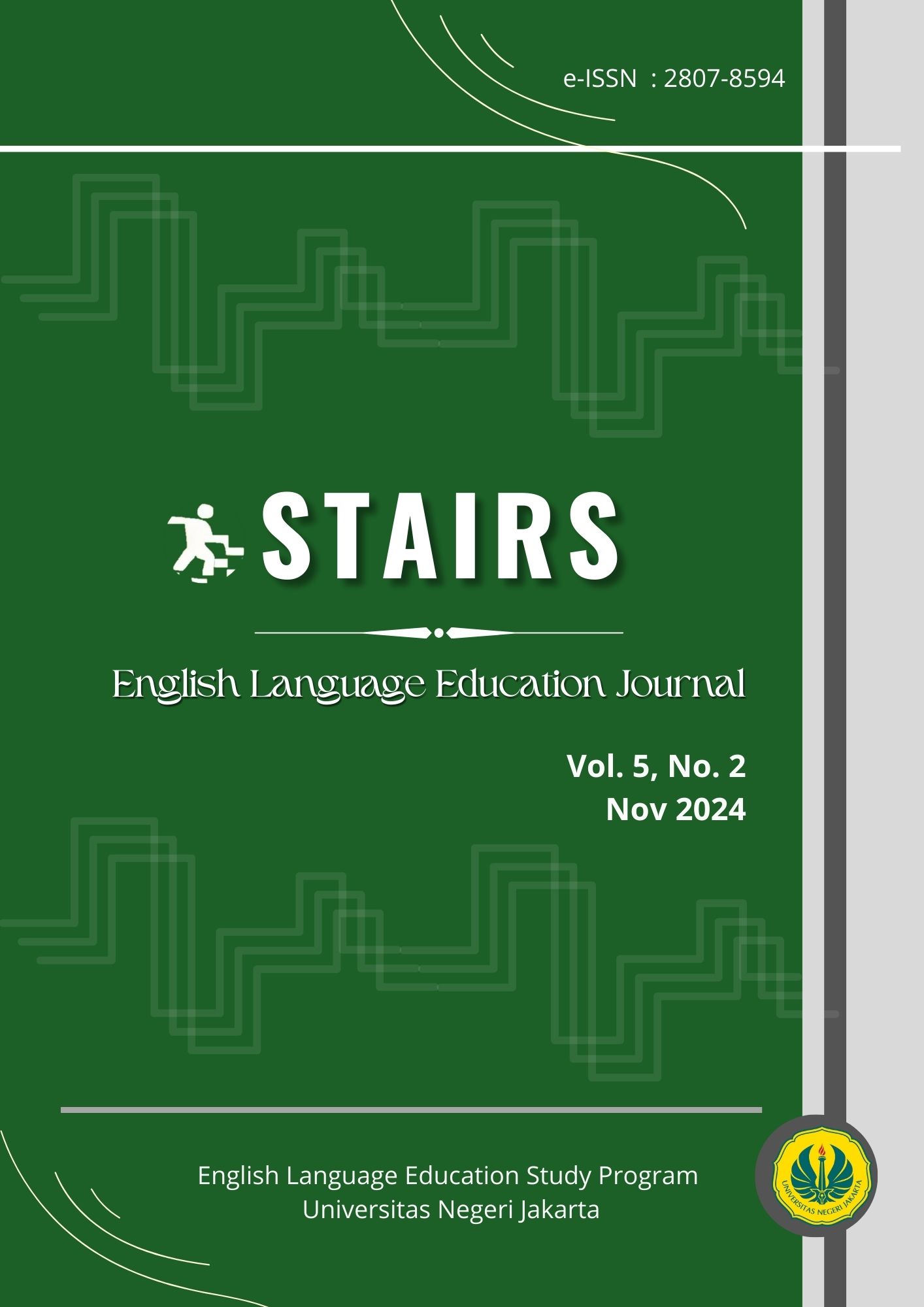The Role of Dee Lestari's Novel " Rapijali: Seeking, Becoming, Returning" in Increasing Reading Skills in the Digital Era
DOI:
https://doi.org/10.21009/stairs.5.2.3Keywords:
Novel analysis, Pragmatic approach, Reading interest, Reading skillsAbstract
In the era of rapid technological development, maintaining interest in reading traditional literary works such as novels has become increasingly challenging. Despite the abundance of research on reading habits, studies examining how contemporary novels can sustain and enhance reading interest in the digital era remain limited. This research aims to explore the role of novels in fostering reading interest in the digital era, focusing on how literary elements can engage modern readers. This study employs a literature review method with a pragmatic approach, which examines literary works as tools for conveying specific messages or intentions to readers. The object of this research is Rapijali: Seeking, Becoming, Returning by Dee Lestari, a novel with the potential to stimulate reading interest across various age groups. Data were collected through intensive reading and note-taking techniques, followed by qualitative analysis to identify key themes and messages. The findings reveal that Rapijali conveys moral values such as hard work, mutual respect, and humility, subtly influencing readers' perspectives. Additionally, the novel’s accessible language, engaging storyline, and serialized format contribute to its appeal, making it an effective medium for promoting reading habits in the digital age. These results imply that well-crafted literary works can still play a significant role in cultivating a culture of reading, even amid technological distractions.
References
Arosida, N., & Septiyani, R. E. (2024). Analisis antropolgi sastra dalam cerpen Filosofi Kopi karya Dee Lestari. Innovative: Journal Of Social Science Research, 4(4), 14599-14608. https://doi.org/10.31004/innovative.v4i4.14717
Faizah, U., Setyorini, N., & Lestari, W. (2024). Novel (Karya sastra) sebagai bahan pembelajaran era 5.0. Scientia, 3(2). https://doi.org/10.51773/sssh.v3i2.321
Fajar, R. (2023). Pengaruh membaca novel Negeri Lima Menara karya Ahmad Fuadi terhadap motivasi belajar santri mas Pondok Pesantren Islam Ibadurrahman Stabat Langkat. JUDIKA: Jurnal Pendidikan Dan Bahasa, 1(1), 1-6. https://doi.org/10.59696/judika.v1i1.11
Gillespie, A., Glăveanu, V. L., & de Saint Laurent, C. (2024). Pragmatism and methodology: Doing research that matters with mixed methods. Cambridge University Press. https://doi.org/10.1017/9781009031066
Grabe, W., & Yamashita, J. (2022). The nature of reading: Defining reading. In: Reading in a second language: Moving from theory to practice. Cambridge Applied Linguistics. Cambridge University Press, 5-23.
Hawthorn, J. (1997). Studying the novel: An introduction (3rd ed.). Hodder Education Publishers.
Ikhwan, W. K. (2021). Pendekatan pragmatik dalam novel Negari Para Bedebah karya Tere Liye. Jurnal Pendidikan Bahasa Dan Sastra Indonesia Metalingua, 6(1), 1-6. https://doi.org/10.21107/metalingua.v6i1.10546
Keraf, G. (2006). Diction and Language Style (16th ed). Jakarta: PT Gramedia Pustaka Utama.
Lestari, D. (n.d.). Siapa: Profil Dewi Lestari. https://www.viva.co.id/siapa/read/985-dewi-lestari retrieved on 19 October 2024
Miller, J. W., & McKenna, M. C. (2016). World literacy: How countries rank and why it matters (1st ed.). Routledge. https://doi.org/10.4324/9781315693934
OECD. (2023). PISA 2022 Results (Volume I): The State of Learning and Equity in Education. PISA, OECD Publishing, Paris, https://doi.org/10.1787/53f23881-en.
Pitri, R., & Sofia, A. (2022). Factor analysis for increasing reading literacy in Indonesia. Parameter: Journal of Statistics. 2(2), 18-25. https://doi.org/10.22487/27765660.2022.v2.i2.15898
Rosdiana. (2024). Perbandingan diksi dalam cerpen klasik dan modern. Fonologi: Jurnal Ilmuan Bahasa Dan Sastra Inggris, 2(1), 257–283. https://doi.org/10.61132/fonologi.v2i1.448
Rusydi, M., Juairiah., & Hamidi. (2022). Utilitas membaca novel Rumah Kertas karya Carlos Maria Dominguez sebagai model meningkatkan minat baca. Pustaka Karya : Jurnal Ilmiah Ilmu Perpustakaan dan Informasi. https://doi.org/10. 59. 10.18592/pk.v10i2.7326
Viany, Y., Lering, M. E. D., & Owon, R. A. S. (2023). Analisis gaya bahasa dalam novel Koala Kumal karya Raditya Dika. Jurnal Genesis Indonesia, 2(02), 95–102. https://doi.org/10.56741/jgi.v2i02.244
Wahyudi, S. (2008). Pengantar Teori Sastra. Jakarta: PT Grasindo.
Wolfe, P. (2001). Brain matters: Translating research into classroom practice. Association for Supervision and Curriculum Development (ASCD). https://us.sagepub.com/sites/default/files/upm-binaries/7086_wolfe_ch_1.pdf



